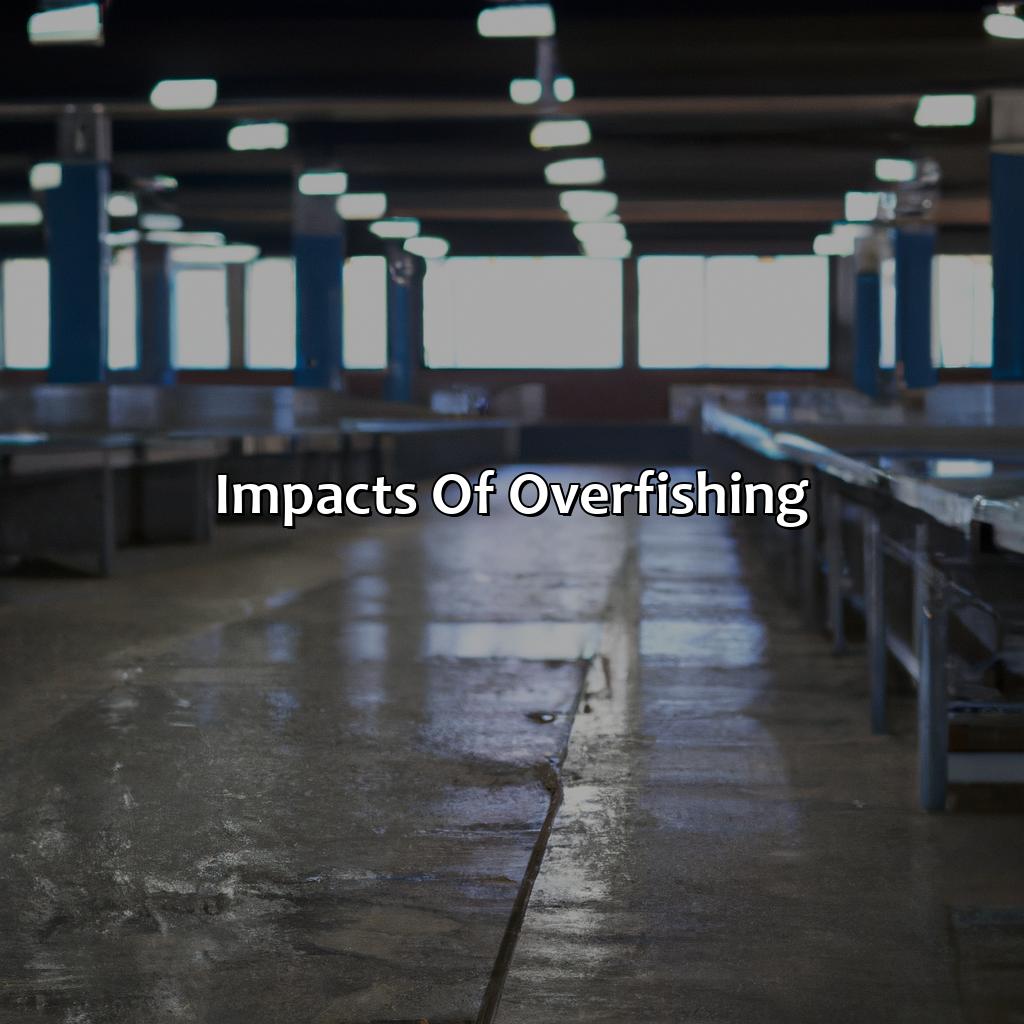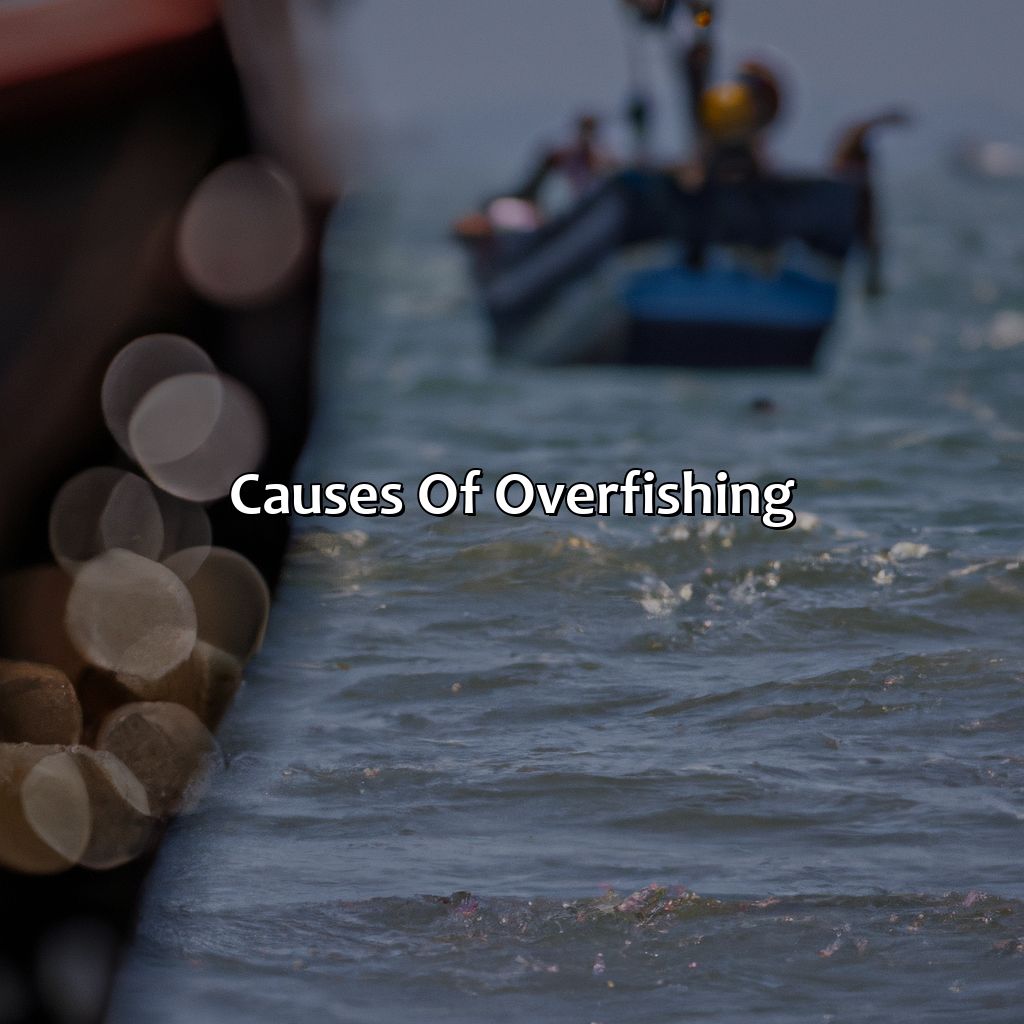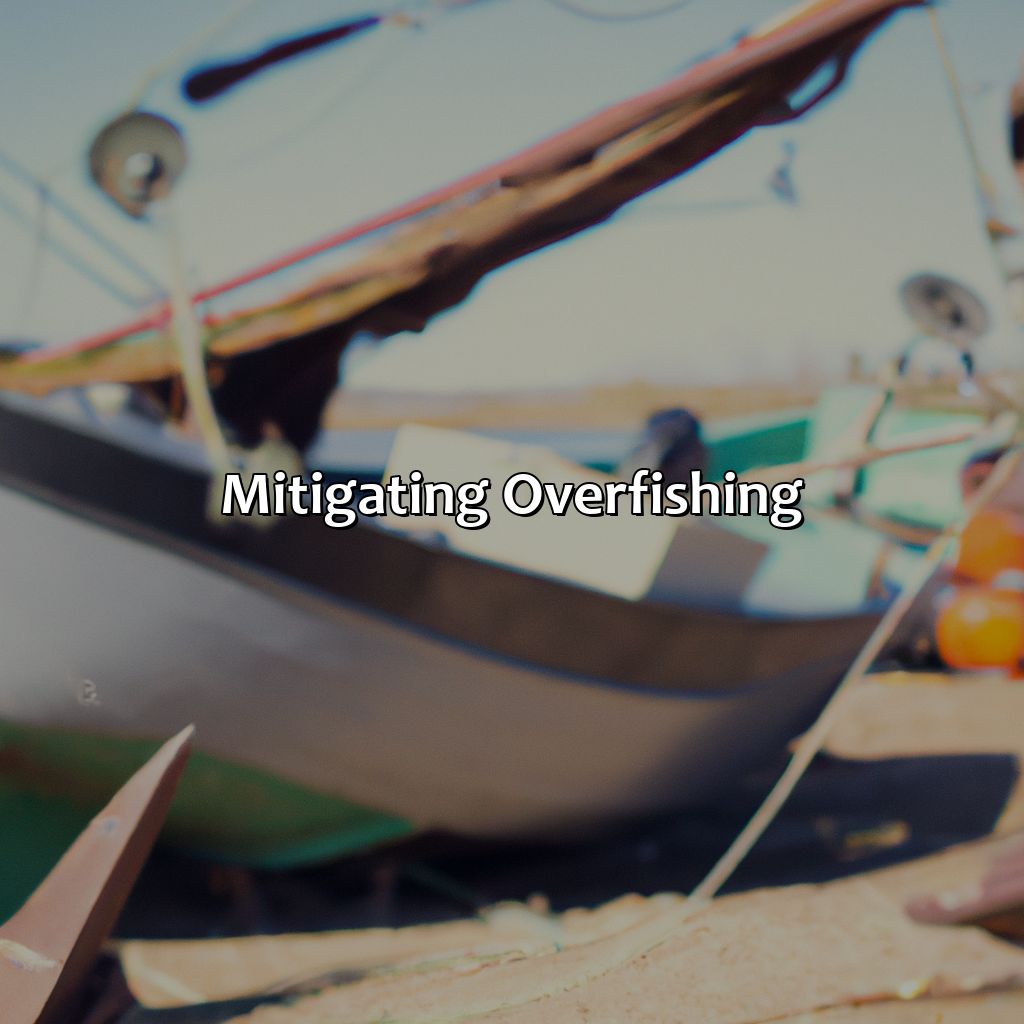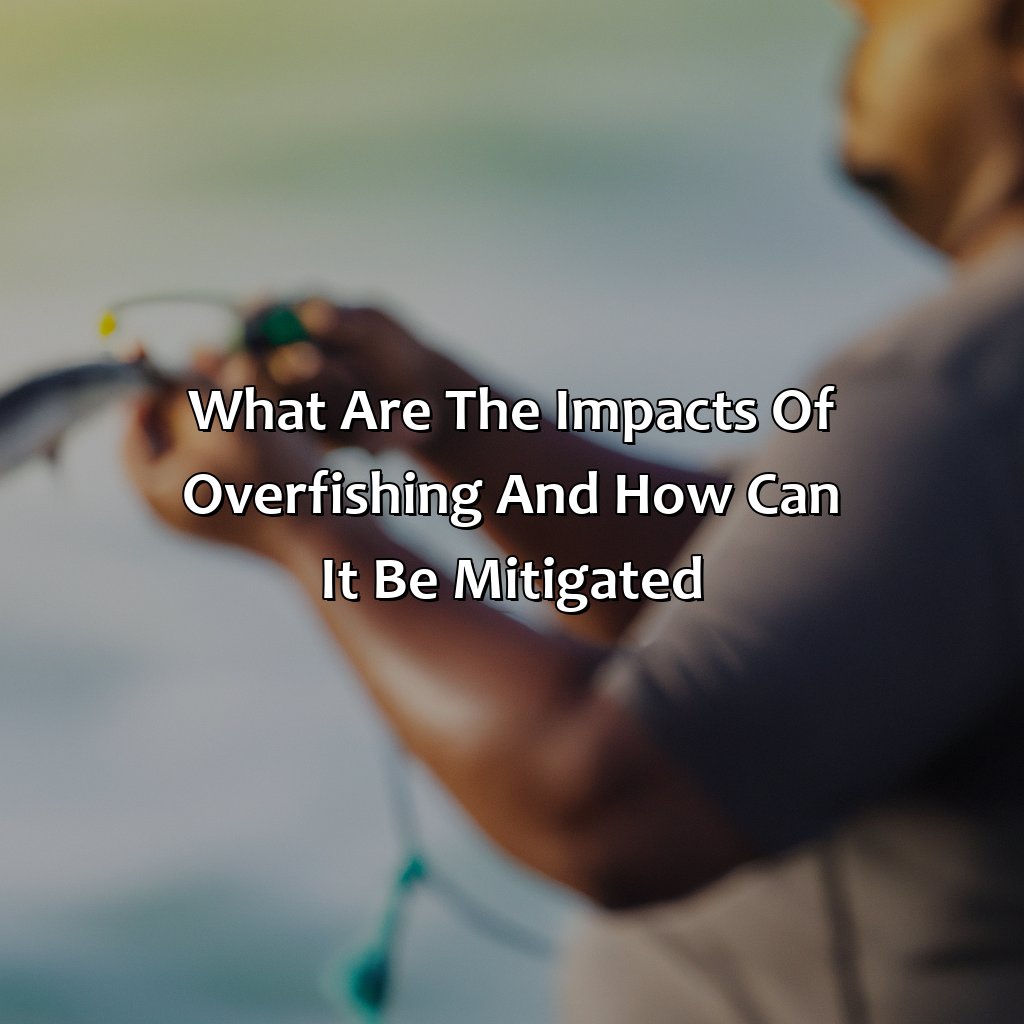Key Takeaway:
- Overfishing leads to depletion of fish populations which results in a significant loss of marine biodiversity. Fishing quotas, catch limits, and accurate stock assessments are a few measures that can be taken to address the depletion of fish stocks.
- Overfishing has ecological impacts such as habitat destruction, bycatch, and the disruption of ecosystem functions. Mitigating these impacts requires ecosystem-based management approaches that prioritize sustainable fishing practices and the preservation of ecosystem resilience.
- Overfishing has significant economic and societal impacts. Post-harvesting losses, fishery subsidies, and the restructuring of the fishing industry can all mitigate the economic losses. Community-based fisheries, policy reform, and education programs can mitigate the societal impacts.
Impacts of Overfishing

Photo Credits: anglinginsight.com by Kevin Nelson
Gaining insight into the impacts of overfishing? Check out the “Impacts of Overfishing” section! It has four sub-sections:
- “Depletion of Fish Populations,”
- “Ecological Imbalance,”
- “Economic Losses,”
- and “Societal Impact.”
These sub-sections explain the various effects of overfishing. These include: fish stocks depletion, habitat destruction, economic losses, and community-based fisheries.
Depletion of Fish Populations
Overfishing has led to a significant decrease in the fish population worldwide, resulting in the depletion of fish stocks. This is primarily due to the inability of fishing quotas and catch limits to keep up with the demand for fish. The overexploitation of certain species can lead to complete extinction, creating ecological imbalances.
Stock assessments are conducted by fisheries managers to monitor the health of fish populations and determine sustainable resource usage levels. However, they have not been effective in preventing further declines in many areas due to the lack of compliance and enforcement.
The increasing global demand for seafood, coupled with advances in fishing technology, has further exacerbated this issue. Illegal fishing practices such as bottom trawling and driftnetting have also added to the problem by causing massive destruction of marine ecosystems.
Mitigation efforts involve implementing regulations and policies such as enforcing fishing quotas, developing sustainable fishing practices, promoting alternative protein sources and raising awareness through education programs. With these efforts combined, we can ensure that our oceans remain teeming with life for generations to come. Don’t let our demand for a quick meal or our own gains cause irreparable damage!
With overfishing comes an ecological imbalance marked by bycatch, habitat destruction, and IUU fishing, resulting in overexploitation and overcapacity, while bottom trawling disrupts nutrient cycling and ecosystem functions – a call for ecosystem-based management and approach.
Ecological Imbalance
Overfishing leads to a disruption of ecological systems, causing an imbalance in the ecosystem functions. The overexploitation of certain fish populations can lead to a decrease in their predator’s food sources, bycatch and habitat destruction. This, in turn, affects nutrient cycling within the ecosystem and ultimately impairs basic ecological functions.
Moreover, bottom trawling practices harm benthic habitats, leading to significant damage, including disturbing nutrient-rich sediments and releasing CO2 from deep-sea carbon stores. IUU fishing only adds fuel to the fire by further deteriorating already damaged ecosystems.
Ecosystem-based management or an ecosystem-based approach can be utilized to mitigate such ecological imbalances. It is an adaptive management process that takes into account scientific information on environmentally sustainable fishing practices and uses models to manage populations based on ecological and socio-economic objectives rather than just a single-species stock assessment.
To understand how it happens at ground-level – a true story occurred when researchers discovered cod and haddock swimming together off Canada’s Atlantic coast. They found that these two fishes’ presence could increase nutrient cycling efficiency between different layers of water bodies while enhancing the adaptation capacity of the ecosystem as a whole. Therefore choosing sustainable fishing like this will ultimately help not only fishermen but also marine ecology as a whole.
Overfishing not only depletes fish populations but also results in major economic losses for the fishing industry, recreational fishing, seafood trade, and post-harvesting losses, highlighting the need for sustainable fishing practices and fishery subsidies.
Economic Losses
Overfishing has not only led to the depletion of fish populations and ecological imbalances but has also resulted in severe economic impacts on the fishing industry, seafood trade, and post-harvesting losses. The unregulated fishing practices have caused a substantial decline in fish stocks, which has negatively affected commercial fisheries and resulted in food insecurity for millions of people worldwide. Moreover, recreational fishing, which generates significant revenue for many economies, is also declining due to overfishing. Fishery subsidies have encouraged unsustainable fishing practices and reinforced overfishing’s negative economic impacts.
The economic losses resulting from overfishing are evident in many communities that rely heavily on fishing as their primary source of income. As fish stocks continue to decline, fishermen are forced to venture further offshore, increasing their costs and reducing their catch volume. This results in lower profits and financial hardships for the fishing industry and related businesses. Furthermore, the seafood trade faces market uncertainties due to dwindling supplies of popular fish species like tuna and salmon.
To mitigate these economic losses caused by overfishing, it’s imperative to regulate fishing activities strictly. This means enforcing laws that limit the amount of fish that can be caught each year and crack down on illegal fishing practices. Additionally, promoting sustainable fishing practices like catch-and-release helps build back depleted fish populations while supporting recreational fisheries.
Moreover, exploring alternative protein sources like plant-based or lab-grown meat would reduce pressure on wild-caught fish populations whilst offering alternative revenue streams for those involved in traditional forms of fisheries. Awareness programs that educate the masses about sustainable seafood choices can help consumers understand their role in preserving marine ecosystems while reinforcing communities dependent on healthy oceans.
According to recent research by World Wildlife Fund (WWF), 64% of global fisheries require significant management reforms to become economically viable again. Overfishing requires interdisciplinary approaches from scientists to sociologists endeavouring towards long-term solutions with governments’ support globally.
Overfishing not only endangers endangered species and disrupts ecological balance, but also cripples coastal communities dependent on fishing, highlighting the urgent need for policy reform and community-based fisheries.
Societal Impact
The human impacts of overfishing are vast and extend beyond the depletion of fish stocks. Coastal communities that rely on fishing for their livelihoods can experience economic insecurity, food scarcity, and even outmigration as a result of overfishing. Furthermore, since many endangered species are also caught in commercial fishing nets, entire ecosystems can be disrupted by the loss of these crucial species.
Policy reform that promotes community-based fisheries and sustainable practices holds promise for mitigating these negative societal impacts while improving human welfare. Without such efforts, the economic and social fallout from overfishing will only continue to worsen. According to a report by the United Nations Food and Agriculture Organization, up to 90 percent of global fish stocks were being exploited or over-exploited as early as 2003.
Unchecked greed and technological advancements have led to overfishing, causing ecological imbalance and economic losses.
Causes of Overfishing

Photo Credits: anglinginsight.com by Elijah King
Gaining insight into why overfishing is happening is essential for lessening its effects. Poor management, along with fishing regulations, gear, and techniques, all point to a lack of control. Technology can make fishing vessels bigger, and gear more destructive, leading to unsustainable fishing. Lastly, activities like IUU fishing are huge factors in depleting fish numbers.
Lack of Regulation
Overfishing is primarily caused by a lack of fishing regulations. Many countries do not have adequate measures in place to prevent overfishing, allowing fishing fleets to use destructive fishing gear and methods without regard for fishing capacity. This has led to a severe depletion of fish populations, ecological imbalances, economic losses and societal impacts.
Without effective fishing regulations, it becomes difficult to control the methods and gear that are used by commercial fishing fleets. Illegal, unreported and unregulated (IUU) fishing practices further exacerbate this problem. IUU practices include transshipment of fish between vessels on the open sea, making it harder to trace the origins of catches.
To mitigate overfishing caused due to lack of regulation, governments need to adopt stricter policies that regulate the number and size of catches allowed. Fishing techniques that cause significant damage also need to be regulated or completely banned in some cases. Additionally, promoting and implementing sustainable fishing practices can help conserve remaining fish stocks while reducing waste.
Awareness-raising programs can help educate consumers on alternative protein sources beyond seafood and why it’s necessary for sustainable development. By avoiding those varieties caught with environmentally damaging methods such as trawling or longlining.
Fishing technology may have advanced, but without regulation, it has led to overcapacity and overexploitation of fish populations, devastating the ecosystem.
Technological Advancements
The Impact of Modern Fishing Techniques
Modern fishing techniques have had a significant impact on the world’s oceans and aquatic ecosystems, leading to severe overcapacity and overexploitation in countless fishing zones. The use of various sophisticated and powerful fishing gear has led to an increase in catches but also caused significant damage to non-target species and critical habitats.
Fishing methods such as longlining, trawling, and purse seining are particularly damaging because they often result in the capture of non-target species that become accidentally entangled. These methods can cause physical damage to marine habitats such as coral reefs, sea beds, and other sensitive ecosystems.
The consequences can be disastrous for marine animals’ populations and natural food chains, disrupting ecological balance across entire regions. Additionally, modern fishing techniques also lead to social impacts by disrupting traditional ways of life for coastal communities that depend on fisheries as a primary source of income.
Accordingly, organizations such as WWF (World Wildlife Fund) have launched campaigns aiming at promoting sustainable fishing practices worldwide. Lawmakers from numerous countries have attempted implementing regulations aimed at addressing these issues more seriously.
It is essential that we invest in alternative protein sources like plant-based ‘seafood’ options, aquaculture facilities with eco-friendly orientations are being established to curb overfishing activities. The focus needs to emphasize the urgency behind addressing these problems before it’s too late.
IUU fishing may seem like a victimless crime, but it leads to overexploitation and depletion of our oceans, ultimately threatening our future food security.
Illegal Fishing Practices
Illicit Fishing Practices:
Despite the efforts to control legal fishing, iuu fishing – illegal, unreported and unregulated activities still occur. These practices are detrimental to the aquatic ecosystem, leading to overexploitation of fish stocks and depletion of various species. Furthermore, iuu fishing often involves the use of destructive methods such as explosives or cyanide poisoning, which further harm marine life and other habitats.
To counteract these evil practices, many countries have implemented stricter monitoring and enforcement measures against iuu fishing. This includes establishing surveillance programs using vessels or electronic tools and imposing hefty penalties for engaging in such activities. Nevertheless, some regions remain vulnerable to iuu fishing due to a lack of resources or political willpower.
An occluded reality:
In many developing nations where regulatory frameworks are weak or non-existent, fishing fleets operate mostly illegally beyond their countries’ territorial waters. Sensitive ecosystems like coral reefs are often destroyed by methods such as dynamite blasting or poisonous chemicals that indiscriminately kill marine life. It’s estimated that by 2048 all commercially exploited fish populations could become irreversibly depleted due to overexploitation which is predominantly caused by illicit fishing practices.
A true story:
A few years ago, a report came out that set into motion efforts against unsustainable commercial fishing practices in Thailand where human trafficking crimes were widespread on ships operating offshore Thai waters without proper documentation; business was so lucrative fishermen were forced into slavery just to crew the boats. A lot has been done since that time in terms of identifying vile actors within the industry though much work still needs doing around sustainable practices within fisheries governance systems worldwide.
From regulation to education, there are various ways we can work towards mitigating overfishing and ensuring sustainable fishing practices for the future.
Mitigating Overfishing

Photo Credits: anglinginsight.com by Terry Mitchell
Regulations and policies must be put in place to battle overfishing. To do this, sustainable fishing practices are needed. Additionally, alternative protein sources can replace wild-caught fish. Awareness and education programs are essential too, as they teach people the importance of ocean conservation.
Regulations and Policies
To combat overfishing, fishing regulations and quotas have been implemented globally to limit catches and preserve fish populations. These regulations include limiting the amount and type of gear used, bans on specific practices such as bottom trawling, and bycatch reduction programs.
In addition to regulations, policy reform is crucial to manage marine ecosystems sustainably. Ecosystem-based conservation and management approaches focus on preserving natural habitats and ensuring ecosystem health. Marine protected areas (MPAs) are also an important tool for conserving biodiversity, reducing fishing pressure, and enhancing fish populations.
Ecosystem-based management involves working with stakeholders in the fishing industry to create sustainable practices that protect the long-term viability of fisheries. This requires collaboration with scientists to gather data about fish stocks, assess impacts of fishing on the ecosystem, and continually evaluate strategies.
Finally, ocean governance plays a role in mitigating overfishing by regulating activities like aquaculture and minimizing pollution that can harm fragile marine ecosystems. Marine spatial planning is a strategic approach that takes into account all factors affecting the health of marine environments when planning future activities.
By implementing these policies, we can improve fishery management practices while preserving species diversity and maintaining healthy ecosystems for generations to come. From using sustainable fishing gear to implementing harvest control rules, adopting responsible fishing methods not only safeguards fish populations but also promotes ecosystem resilience and supports small-scale and artisanal fishing communities.
Sustainable Fishing Practices
Sustainability is key in ensuring the longevity of our marine ecosystems. By utilizing sustainable fishing methods, we can protect fish populations from overexploitation and ensure that future generations can continue to benefit from our oceans. Small-scale and artisanal fishing, as well as aquaculture and fish farming, offer more sustainable alternatives to large-scale fishing operations that often use destructive fishing gear.
Implementing harvest control rules based on sound fishery assessments will aid in maintaining ecosystem resilience, which in turn will promote better fisheries management practices. It is essential for marine science communities and policymakers to collaborate in developing effective and equitable regulations to protect our oceans while still sustaining viable commercial fishing industries.
Fish-free diets can have a silver lining for the oceans, as alternative protein sources and sustainable seafood consumption pave the way for healthier marine ecosystems and alternative livelihoods.
Alternative Protein Sources
Sustainability through Alternative Protein Sources
Alternative protein sources can provide a sustainable solution to the overfishing crisis. These proteins are derived from non-aquatic sources and can supplement or replace traditional seafood consumption.
A comparison table of alternative protein sources, their protein content per 100 grams, and a brief description of their taste and texture is outlined below:
| Protein Source | Protein Content (g) | Taste and Texture Description |
| Pulses (peas, lentils, beans) | 8-24g | Nutty flavor; varies in texture from mushy to crisp |
| Nuts and Seeds (almonds, chia seeds) | 5-22g | Varying nutty flavors; often crunchy or chewy textures |
| Soy Products (tofu, tempeh) | 11-15g | Spongy texture with neutral flavor that picks up seasoning well |
Alternative protein sources can offer unique benefits beyond sustainability. Some options like pulses also offer other essential nutrients like iron and fiber. Additionally, incorporating these alternatives into diets can support alternative livelihoods for farmers who grow them.
Pro Tip: Explore alternative protein options when shopping or cooking meals to reduce reliance on unsustainable seafood intake.
By educating the public on ocean conservation and the impacts of marine pollution, we can protect marine wildlife, preserve habitats and prevent further environmental damage.
Awareness and Education Programs
Educational programs minimize environmental damage by spreading marine ethics and promoting conservation measures to ensure sustainable harvesting practices. The importance of protecting and enhancing ecosystem services, such as ocean conservation, marine wildlife, habitat protection, and reduction of marine pollution, is emphasized through these programs. Learning about marine reserve management and conservation biology helps encourage policy makers and citizens alike to engage in effective program implementations for the wise use of natural resources. Well-informed education strategies effectively increase knowledge on fundamental environmental concepts within fishermen communities which leads to a prompt adaptation of sustainable fishing practices.
A well-structured educational outreach campaign helps educate commercial fishing groups by ensuring the adoption of sustainable fishing methods- reducing by-catch, habitat protection initiatives through gear modifications that avoid damaging fishing equipment like bottom trawlers in sensitive habitats. Additionally, it seeks to address illegal fishing activities that primarily contribute towards overfishing-induced extinctions. Encouraging greater participation in ocean conservation planning decisions will help foster understanding of marine ethical responsibilities across humanity.
Providing training seminars on best practices during catch handling adds value to themselves as skilled professionals while making an environment-friendly livelihood beneficial for one another – both socially and ecologically sound. Thus, ongoing education programs are crucial for continued progress in mitigating the impacts of overfishing and conserving our planet’s oceans.
Several examples demonstrate the effectiveness of educational campaigns aimed at increasing public awareness about the dangers associated with overfishing; children’s booklets, for instance, have been employed worldwide to teach younger generations about how they can contribute towards conservation efforts sustainably without undermining their socioeconomic needs or aspirations while safeguarding ecological necessities for future generations as a way of advancing more profound change within society at large.
Five Facts About Overfishing and Its Mitigation:
- ✅ Overfishing reduces fish populations, which in turn affects the marine ecosystem and the food chain. (Source: National Geographic)
- ✅ Overfishing can result in the extinction of certain fish species, leading to the loss of biodiversity. (Source: World Wildlife Fund)
- ✅ Overfishing affects the livelihoods of millions of people who depend on fishing for food security and income. (Source: United Nations)
- ✅ Efforts to mitigate overfishing include implementing sustainable fishing practices, setting catch limits, and establishing marine protected areas. (Source: NOAA Fisheries)
- ✅ Consumers can also play a role in mitigating overfishing by choosing sustainably caught seafood and supporting fisheries that use responsible fishing practices. (Source: Monterey Bay Aquarium Seafood Watch)


Very efficiently written article. It will be useful to anybody who utilizes it, as well as yours truly :). Keep up the good work – can’r wait to read more posts.
Comment awaiting moderation.